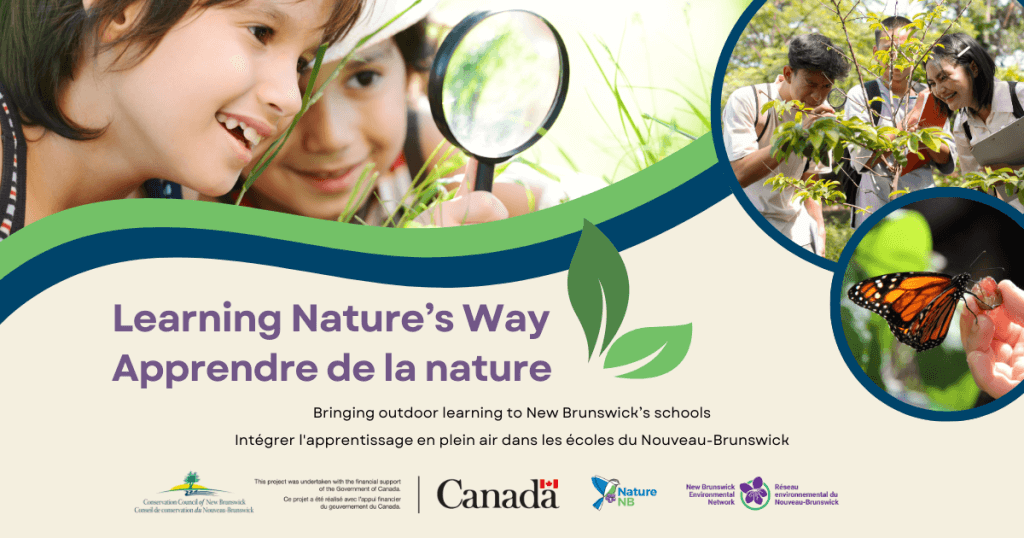
Learning Nature’s Way, a new environmental education initiative for New Brunswick schools
Young people today are inheriting enormous environmental challenges, which is why it’s more important than ever for K-12 students to understand what’s happening and feel empowered to take action.
That’s why the Conservation Council of New Brunswick (CCNB), the New Brunswick Environmental Network (NBEN) and Nature NB are partnering to launch Learning Nature’s Way — an exciting new nature education initiative for New Brunswick schools. This project, supported by the Government of Canada through the Environmental Damages Fund’s Climate Action and Awareness Fund, will get students learning outside, exploring nature, and discovering how they can make a real difference in their communities.
Over the next two years, Learning Nature’s Way will create a provincewide network of non-traditional environmental educators that will offer current, place-based, curriculum-linked environmental and climate change-centered programming. By the end of the project, the network will offer immersive programming to more than 7,500 students in K-12 classrooms across the province who will learn about the environment in fun and hands-on ways. Lessons will help students learn about local ecosystems, climate change, and how to care for the land, air and water around them.
The Benefits of Outdoor Learning
Outdoor learning — when students get to discover creatures in their dipnets by the pond, imagine themselves to be an animal while romping through the woods, or share their feelings about climate change in a talking circle around a campfire — isn’t just about fun. It’s been shown to have widespread positive impacts for students.
Studies have found that outdoor learning can support students’ bodies and minds. Spending time in nature can reduce stress, improve sleep, and support better mental health.
Learning outside increases student focus and deepens their understanding of their lessons. This kind of learning often boosts creativity, improves problem-solving skills, and even raises academic performance.
Just as important, outdoor education helps young people build confidence, work well with others, and feel more connected to their communities. Whether by working in teams, finding their way through a trail, journaling in nature, or helping with a schoolyard garden, students develop social skills and improved self-esteem through these experiences.
Most of all, Learning Nature’s Way will give students a deeper connection with nature. The more time they spend learning about the environment around them, the more they care about it and the more likely they are to take action to protect it.
And it all starts with taking students outside.
Our First Steps
The Conservation Council, the NBEN, and Nature NB have already begun work on creating the educational framework that will guide this project. The project team is excited to bring together stakeholders from across the province to discuss what makes the highest quality environmental education for our students and how Learning Nature’s Way can be supportive and inclusive for youth across New Brunswick’s diverse communities.
The project team is committed to ensuring that Anglophone, Francophone, and Wabanaki voices are all included in shaping this new initiative.
We look forward to further discussions and workshops that will increase our capacity across the province and further our shared goal of increasing awareness and empowering New Brunswickers of all ages to take actions for nature.
Currently Seeking Pilot Schools
Are you a teacher or administrator interested in having your school host a program from our network of environmental educators? Our project team would love to hear from you. Please contact project co-ordinator Annie Furman (annie.furman@conservationcouncil.ca) with any questions.
We’re thrilled to foster the next generation of environmental stewards, one meaningful outdoor experience at a time.




